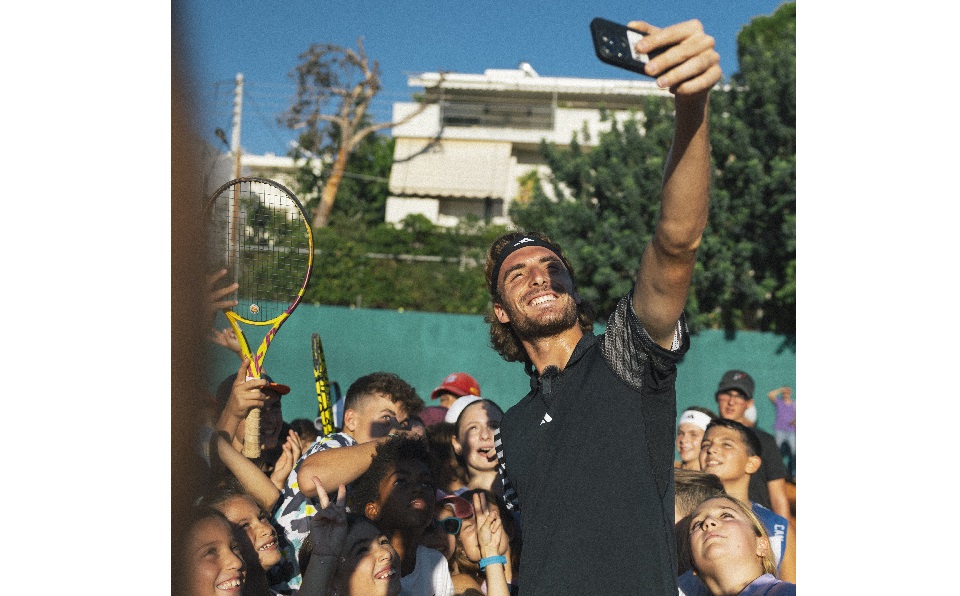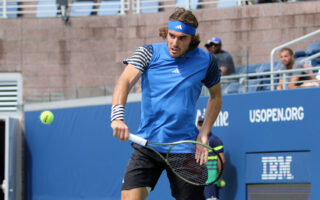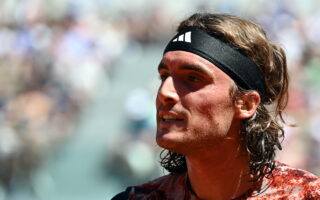‘The top isn’t everything’
Greek tennis star talks about his drive to become better, his relationship with Paula Badosa, his father and the glint in Novak Djokovic’s eye

The visit was supposed to be a surprise, but news of it seemed to have leaked. It was 5 o’clock on Wednesday afternoon at the Glyfada Tennis Club in southern Athens and a small crowd had gathered, throbbing with anticipation.
When Stefanos Tsitsipas arrived at the club where he started his career – one that took him to greater heights that any Greek tennis player has ever accomplished – his fans and acolytes greeted him with enthusiasm. But he seemed equally to enjoy the occasion, hitting a ball around with them on the courts, taking photographs, signing hundreds of autographs and deftly managing the shy younger fans and overbearing parents. He even appeared moved at one point.
Later, at the offices of the Adidas sportswear company, where we sat down for an interview, I asked him what returning to Glyfada meant for him. “It was emotional; more than I expected,” he told Kathimerini. “It’s something I had been trying to organize for five years, with Adidas, but the pieces had not fallen into place to make it happen until now. I learned to play tennis on those courts; I owe my career to that start at the Glyfada Tennis Club.”
Tsitsipas also expresses his gratitude for the first two people to coach him at the club. “Giorgos Spiliopoulos taught me discipline, to be respectful on the court. He’s the reason I fell in love with tennis. Giorgos Fountoukos made me see how far I could go in tennis. He unlocked my talent.”
The Greek champion was in Athens to take part in the qualifying game weekend at the Panathenaic Stadium (Kallimarmaro) between teams Greece and Slovakia for the Davis Cup, the biggest event on the tennis calendar in terms of national teams. I asked him what it meant to play a particularly solitary sport for the national colors.
“I have always wanted to put Greece in the World Group of the Davis Cup; it’s something that has never been done in the history of tennis in our country,” he says, referring to the 18 national teams that take part in the main leg of the event, known informally as the “Tennis World Cup.”
“Making it is a huge achievement, similar to reaching the quarterfinals or even the semifinals in the soccer World Cup,” he says, noting that you often see players transcend the framework of the solitary game that is the norm in the ATP Tour when participating in tournaments like the Davis Cup. “I often see them becoming more passionate when they’re playing for the national flag – this has happened to me too,” he says.
The competition
Tsitsipas’ personal career, on the other hand, is at a “crossroads,” as veteran tennis journalist Christopher Clarey recently described it. He started the season with an impressive performance at the Australian Open, reaching the finals. Clinching the title, apart from being his first Grand Slam, would have propelled him to the top of the global rankings. Unfortunately, he hit the wall called Novak Djokovic.
‘People always see things from their own perspective. I have been misunderstood so many times, but there’s nothing I can do about it. I’m going to keep being me’
Since that defeat, 25-year-old Tsitsipas’ performance has been lackluster. He is still high in the rankings as fifth seed but many wonder whether he missed his opportunity and the baton will pass straight from the greats of the “golden generation” (Roger Federer, Rafael Nadal, Djokovic) to Carlos Alcaraz and the other incredibly promising 20-somethings. Have the skeptics gotten to him?
“There was a period roughly between 2018 and 2020, before Alcaraz, [Jannik] Sinner and [Holger] Rune, when all the lights were on me, [Alexander] Zverev and Dominic Thiem. This has changed,” he admits. “We’re not that young anymore.”
The younger players “play with incredible energy and thirst, and zero fear,” he says. “They play without anything weighing on their minds; free of care.” His tone is almost nostalgic, as if he’s talking about himself five years ago.
I ask him if he still has that thirst, if he wakes up and goes to sleep thinking about his first Grand Slam, the top of the ATP Rankings. “I certainly think about it a lot, but the top isn’t everything. I was addicted to this target when I was younger and this deprived me of something. This doesn’t mean that I’m not happy with what I have accomplished; I do want to improve as a player. But the key is finding a balance between your private life, building something with someone, and moving ahead in your career, with that person’s help.”
Paula Badosa, the Spanish tennis player and Tsitsipas’ girlfriend, was in Athens with him. “Her presence in my life helps me a lot,” he says. “She has changed my approach to the game in a way that I never expected.”
This brings us to the criticism he has come under about his relationship with Badosa, which some say is distracting him from the game, and with his father and coach, Apostolos Tsitsipas. “I’ve been told that I need to change him hundreds of times. But this comes from people who don’t know what my daily routine looks like. I train six days a week and spend more than half the day, every day, working out, doing physical therapy and talking to my team about nutrition – doing everything I need to do to reach the next level,” he says.
Tsitsipas also confirms the end of Greek-Australian Mark Philippoussis’ very brief stint as his coach. “What we’d said with Mark was that we would do the American part of the season together, as a trial: Mexico, Cincinnati and the US Open. That partnership has ended and the baton is going back to my father.”
The Djokovic phenomenon
Three days before our meeting with Tsitsipas, Djokovic, now 36 years old, won the US Open and climbed back into the top spot of the ATP Rankings. He has more Grand Slams than any other player in the history of tennis, and this was his 24th. I ask Tsitsipas how he explains the phenomenon and whether the Serbian star is the greatest tennis player of all time.
“He is no doubt the best, going by numbers. He breaks record after record,” he responds. “He also has the thirst, even though he has nothing to prove anymore,” I add. “That’s how he’s wired. He’s never happy; it’s like he’s always trying to prove something to someone. I don’t know what or to whom. It’s like he always wants a rematch. He has that glint in his eye,” says Tsitsipas, going on to refer to the match against Alcaraz in Cincinnati in August. “I never thought that Alcaraz would lose that game. Yet Djokovic found a way to make that happen.”
On the other hand, approaching the question from the prism of who has inspired people more and who has made the biggest impact, “then it’s Federer, by a landslide,” says Tsitsipas. “The finesse and beauty he brought to tennis, his magic on the court. I don’t think anyone else will ever match him,” Tsitsipas adds of the Swiss superstar, stating his obvious preference. Last but not least, as far as Nadal is concerned, Tsitsipas hails the Spanish player “as the greatest fighter I have ever seen, and not just in tennis, but in any sport.”
The toll of the tour
Tennis, at least for those players who reach the big leagues, is a very lucrative sport (Tsitsipas has made more than $27 million from tournaments alone), but it is also extremely demanding, with a grueling game schedule. What is the hardest part of life on the tour?
“Sleeping in a different bed almost every seven days; a different city, a new hotel, having to recover from jet lag and start training before each tournament… Doing that 32-34 weeks a year has an enormous impact on the body and on the mind,” says Tsitsipas.
How does he deal with the consequences? “I try to stay at hotels that are clean, where I feel comfortable. I’ve had some very bad experiences in the past that affected my psychology on the court. It’s important to feel like you’re at home, to have an atmosphere where you’re happy to go back to your room. The same goes for your team: They need to inspire you, make you happy, want the best for you instead of looking out for their own interests.”
The social media maelstrom
Our discussion could not skip over Tsitsipas’ public persona and the reactions he often provokes with his social media posts. “Look, I work very hard and I try, when I’m off the court, to reward myself with some nice things,” he says.
He refers to one of his more controversial posts regarding a visit to London’s iconic luxury department store, Harrods. “It was my first time there and I was surprised at how great it made me feel, as a tourist in London. My first thought was how nice it would be to have something like that in Athens, for the tourists; how much it would help the country’s economy and reputation.”
“The comment was not taken like that,” I observe. “Not at all. People always see things from their own perspective. I have been misunderstood so many times, but there’s nothing I can do about it. I’m going to keep being me. We all have our opinions and we should express them freely,” he responds. “But given how eager some users are to misconstrue these opinions, perhaps some things are best left unsaid,” I counter. “Right,” he says.
We went on to chat some more about tennis in general, about the great players who reached the top before he was even born. He spoke with spirit and enthusiasm, showing his love for the game. I remembered his demeanor earlier, when he was signing autographs. He was happy with his visit to the club, but the task of managing fame seemed to cast a shadow. His face, however, would light up when he saw someone he knew.
Now it remains to be seen whether his father’s return as coach will give him the reassurance he needs and whether he will hold onto the thirst that will take him to new heights.





